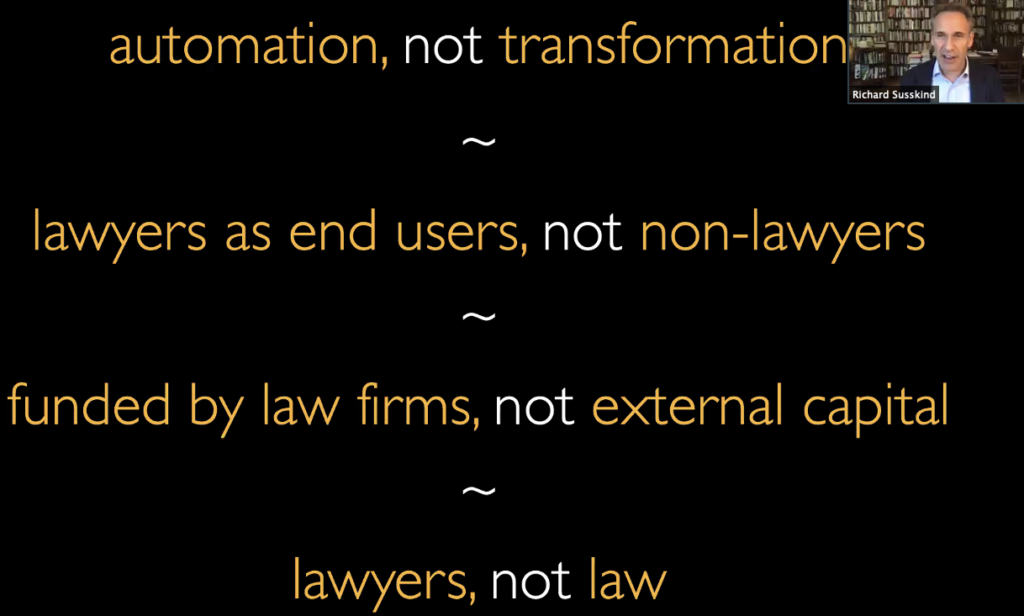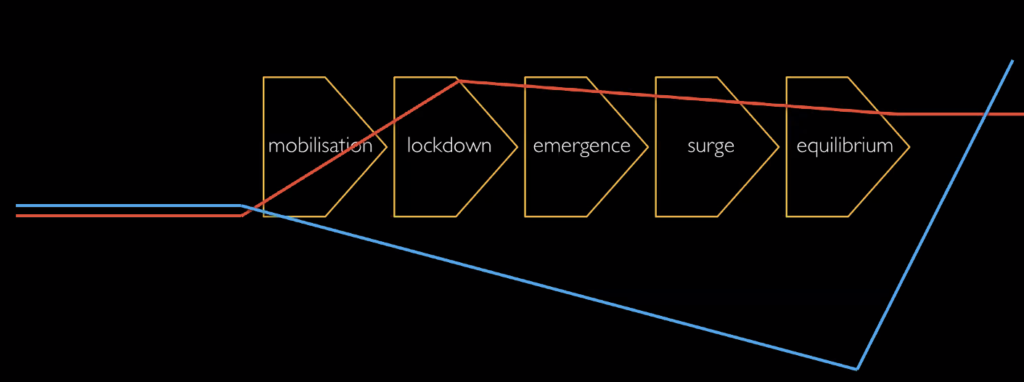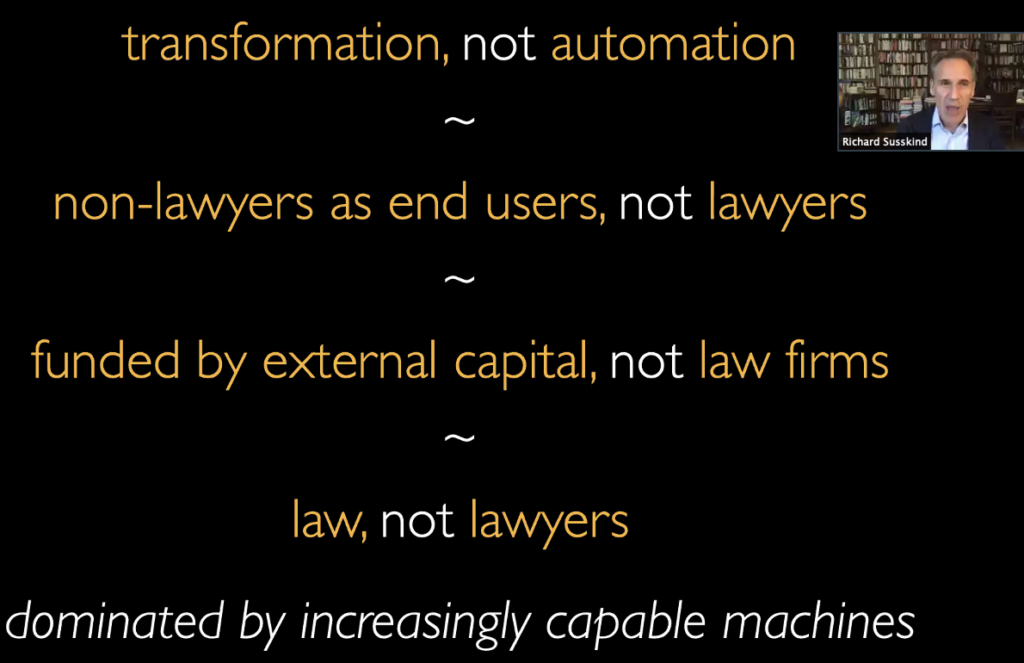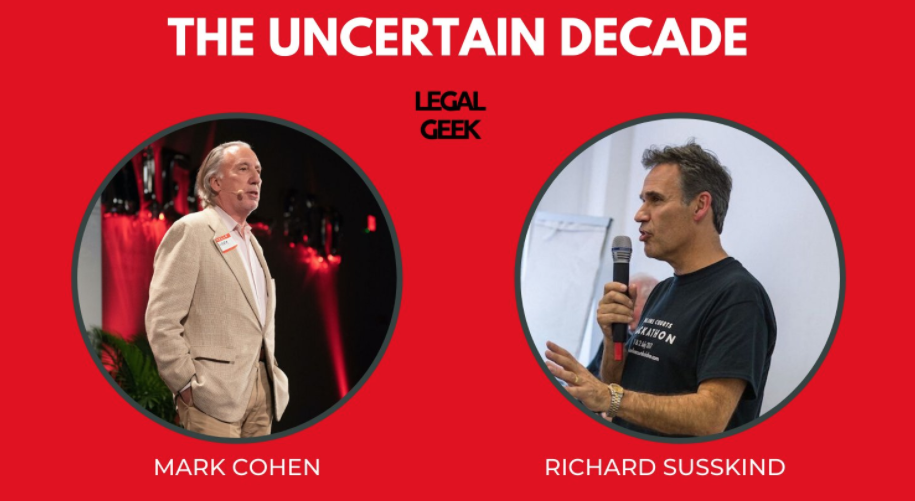This is a live blog post of a 90-minutes video discussion with Richard Susskind and Mark Cohen about “Digital transformation and the legal function” and “The future of legal technology”. It is hosted by Legal Geek and sponsored by Thomson Reuters, UnitedLex, and iManage.
This is the fourth of a four-part discussion, The Uncertain Decade, “Richard Susskind and Mark Cohen debate the future of the legal industry”. (Prior posts: Session 1 and Session 2 and Session 3).
This is a live blog post; I publish as the event finishes. Please forgive typos and misunderstandings of meaning.
Richard Susskind Opens with 10 Minutes on Legal Tech
Legal tech started in the 1950s. The history since then falls under 4 categories:

Another 4 headings about tech generally
- Exponential growth across the board
- Increasingly capable
- Increasingly pervasive
- Increasingly connected
These combined lead to a new economy. An example of the progress:

Tech is getting closer to understanding and projecting human emotion.
Social networks have been extended beyond what we initially expected. Examples include networks for patients, architects, and tax professionals.
The most startling feature: there is no finishing line. The pace of change accelerates.
What does this mean for law:
- Communities of legal experience. Consumers will get advice on line from fellow citizens. And that includes in-house counsel as a community.
- Virtual reality. This is coming soon and, at minimum, will have an impact on training (simulated environments). But impact could be broadly much larger, eg, in negotiations. It’s early days and sounds like science fiction, but it’s coming rapidly.
- Embedded law. Rules can be embedded in systems. More and more systems – manufacturers and financial services to name two – will embed law into core systems.
- Artificial intelligence. Spends rest of his opening time on this…
Richard did a PhD on AI in the 1980s. Built an advisory system in the 1980s – a huge decision tree. That was the first generation over 30 years ago. We did not anticipate the coming of the web or machine learning. That has moved from programmed systems to ones that learn from massive data volumes and huge computing power.
Lawyers still don’t really understand AI. They think it will copy how humans work. But AI is not about task substitution. It’s about finding completely different ways of doing things. “We will find different ways of delivering the same outcomes.”
Richard explains two paths out of the COVID period. Red is our current path. Red is the tech-driven line that takes us down a new path, delivering lower cost legal advice with re-though and automated approaches

The future in summary:

In discussing the above slide, one point stood out for me: “taking cost out of the law”
Mark and Richard Discussion on Legal Tech and Automation
Mark: On your point Richard that law will not be about lawyers in the future. If that’s the true, how will lawyers function?
Richard: The question is not role of lawyers, it’s how we solve legal problems in the future. We should not assume the current model continues. We can imagine document generation systems creating documents, not lawyers. So we will need those trained to develop those systems – and if they are lawyers, they are not charging by the hour.
Mark: AI is not about replicating olds ways, it’s delivering new ways to get outcomes. Is the focus going to shift what customers, clients, and society need and how should lawyers reenginner themselves?
Richard: Yes, that is a good restatement. We always need to rethink how we get to outcomes. The customer and client want outcomes and don’t care how to get there. (EG: people went peace of mind, not necessarily therapists). Richard is struck that most legal tech is for lawyers today. In the future, legal tech will serve people and clients directly.
Mark: Thirty years ago I too noticed as a managing partner that the tech was for lawyers and too improve profitability. Nothing was directed at clients. Has that changed?
Richard: No. Law firms spend 5 to 10% of revenue on tech. Probably 90% of that spend is for the back office. Richard asks law firm leaders what percent of the tech spend is directed at client service and experience. The answer is usually 5%. The catalyst to change this will be the COO of client law departments.
Audience Poll Topic Selection: Improving Client Experience
Richard tell his law firm clients that all their email messages look the same to clients. It would not be that hard, however, to differentiate that most common form of interaction with clients. That could include speed of response to formatting. The bigger point is that firms do not seem to care – they do not focus on client experience.
Mark – we do need to focus more on both outcomes and client experience. Many surveys show that lawyers think they are doing great but their clients think otherwise. Lawyers must take move to focus more on the customer experience.
Richard observes that in our daily experience – restaurants for example – we have an experience crafted for the customer. Design thinking, especially including the client, would be a major leap ahead.
Mark – what is a lawyer for? Compare it to medicine. Medicine has become about an entire system more than the individual doctor. Will law follow that model? The systems is supposed to maximize patient outcomes.
Richard: We have moved from handcrafting most goods to mass manufacturing. We will see that transition in the professions. Inn medicine, we look for prevention: once we have a COVID vaccine, we will need less care. And everyone agrees that’s what we need. The legal market needs the same prevention mindset. If a surgeon said “I have a techie to look after the instruments and devices” you would be upset. But lawyers still are happy to delegate the tech.
Mark on Digital Transformation for 10 Minutes
“Digital transformation” is often uttered but has not definition in the legal market. In contrast, it has been front and center for most industries. Gartner research found that for CEOs, digital transformation is the number one priority. And the number two priority is to find the talent to develop new ways to deliver.
COVID-19 has become a catalyst for even more rapid digital transformation. Warren Buffet says it should be the focus on all companies.
In legal, digital transformation is about customers, creating new ways to connect customers and providers, ensuring customer satisfaction, and improving the customer experience. It is not about technology, though tech supports and enable transformation. Other elements of digital transformation include:
- Digital transformation is also aided by data. Decisions must increasingly be informed by data.
- It’s also about cultural and market adaptation.
- Collaboration.
- Diversity – who should allowed to enter the industry. We need technologists, data analysts, and other competencies
Yet lawyers lag on this while their clients charge ahead on these fronts. Lawyers have operated with little change. Mark points out in his 40 years in the legal market, not that much has changed.
McKinsey found that digitally transformed are 23x times more likely to get new customers and 6x times more likely to keep them.
A key implication of digital transformation is that “Lawyers are no longer the judges of their own performance, buyers are”.
Buyers of legal services wan proactive defenders of their business and providers who collaborate with them to drive enterprise value. To achieve this, lawyers and the legal market must reimagine how they deliver, how they achieve better client outcomes and client satisfaction.
How does legal transform. Gartner finds only a small percent in legal are prepared. Lawyers must be open to new paradigms. It’s not just about retooling the billable hour or cosmetic increases in internal-facing tech spend.
Hiring will have to change. Legal providers must be more data driven. Regulators will have to rethink the regulations.
To those who say all this is hype, remember that other players and professions can and will and have migrated into legal. “Adapt or be marginalized”
Discussion
Richard: Do we decide to compete with digital transformation or become a part of it? Young lawyers may think there is enough traditional work to keep going and be happy to compete with transformation. But they could also choose to participate and lead the transformation. The question is not just for individual lawyers – it’s also for law firms.
A question for Mark: is transformation evolutionary or revolutionary?
Mark: When I co-founded Clearspire, we said “revolutionary”. but that was probably a mistake. The speed of change depends on how insistence legal buyers will be, and how much pressure they put on incumbents. With businesses fundamentally transforming, I don’t see the legal function being granted a pass.
Audience Poll Topic Selection: New Skills
Richard: We need new leadership skills at law firms. Management for decades has been more of the same with minor adjustment. But transformation will require new skills and new thinking. I am focusing on law firms because new providers are the transformers.
Mark: On law firms, they are hard to transform with older partners controlling them. They have no incentive to change. To transform, firms need some <30 on management committee. Recruiting needs to recruit professionals beyond JDs. On new providers, Mark notes that some leading ones – Deloitte, United Lex, and Axiom – have named very senior, experienced executives from outside legal.
Richard: Law firms have trouble giving technologists, data analysts, and other professionals due recognition because they are often viewed as 2nd class citizens by lawyers. In contrast, they are 1st class at alternative providers. “Many law firms have been driven by hobbyists”. Lawyers may be great law practice but they are not necessarily good at business or tech.
Mark: In law firms, what’s most valued is a book of a business. In other businesses, the emphasis may be on driving client satisfaction. Law firms should consider collaborating with new providers to gain access to the talent they need.
Q&A
Nancy Jessen of UnitedLex leads Q&A.
How do we define value in law? Mark says a financial impact on your department and enterprise. Nancy asks Richard how law firms need to change their operating model to generate value. Richard says the more for less challenge does drive law firms to change: lower cost labor and automation. But value metrics vary depending on the situation. But much of the value comes from “disasters averted” – and that is hard to quantify.
Liability if something goes wrong? Richard: is there an insurer willing to underwrite risks? That depends on the size of the market.
Do buyers’ risk tolerance need to change to accept new approaches? The answer will be driven by the C-suite overall. CFO may provide impetus to accept new ways.
Can we move to using non-legal language. Richard notes England has done work on this front. It’s key to inform people about their rights and obligations in language they can understand. The law must be more accessible to people. Richard likens this to computing’s history. Initially, computing was ones and zeroes or very complex systems for experts to use. Today, many lawyers make it easy. We need that same transition for law.
What’s one step to transform? Richard – for law firms to have many stakeholders committed to change and tech. Change depends on broad support, not a few techies or change agents. The buy-in to change and to use tech must be universal.
Mark – I’d like to see a platform that creates a market place for buyers. Like Uber, it would have ratings of providers. Make the market not geographically dependent.
How can law firms square privacy and data protection with more data analytics? Richard: this goes to the liability red herring. Lawyers and law firms will raise liability or privacy as excuse not to use. It’s not hard to comply.
Legal tech fads versus trends here to stay? Richard – indeed, there often does seem to be a flavor of the month. We need to avoid the gadget mentality. Avoid focusing on a tech without a clear idea of how it will enable improvements. Mark – tech, like data, does not all have equal value. The question is how does tech contribute value to the client and customer. Focus on utility, not cool.
Impact of AI on legal? Richard – not much in two years but a lot by 2030.
How should those starting legal careers prepare? Mark – think long and hard what a legal career will be like. If the objective is to have a career like someone winding down a traditional lawyer’s role, then “you are barking up the wrong tree.” But if you are aware of completely different types of careers in the legal industry, it’s a great time. With the caveat that in USA, it costs too much to become a lawyer, but other jurisdictions do not create such a big financial ditch.
Gender inequality in legal tech. Richard – it always disappoints me to see this. Technology generally fails to attract many women. Mark – problem extends beyond law and a big factor is lack of access to capital.
How do explain to 25 y.o. that you need a printer and post to buy a house? Richard: I think that house buying will digitalize this decade – many signs point to an accelerated change on this.
Archives
Blog Categories
- Alternative Legal Provider (44)
- Artificial Intelligence (AI) (57)
- Bar Regulation (13)
- Best Practices (39)
- Big Data and Data Science (14)
- Blockchain (10)
- Bloomberg Biz of Law Summit – Live (6)
- Business Intelligence (21)
- Contract Management (21)
- Cool Legal Conferences (13)
- COVID-19 (11)
- Design (5)
- Do Less Law (40)
- eDiscovery and Litigation Support (165)
- Experience Management (12)
- Extranets (11)
- General (194)
- Innovation and Change Management (188)
- Interesting Technology (105)
- Knowledge Management (229)
- Law Department Management (20)
- Law Departments / Client Service (120)
- Law Factory v. Bet the Farm (30)
- Law Firm Service Delivery (128)
- Law Firm Staffing (27)
- Law Libraries (6)
- Legal market survey featured (6)
- Legal Process Improvement (27)
- Legal Project Management (26)
- Legal Secretaries – Their Future (17)
- Legal Tech Start-Ups (18)
- Litigation Finance (5)
- Low Cost Law Firm Centers (22)
- Management and Technology (179)
- Notices re this Blog (10)
- Online Legal Services (64)
- Outsourcing (141)
- Personal Productivity (40)
- Roundup (58)
- Structure of Legal Business (2)
- Supplier News (13)
- Visual Intelligence (14)

